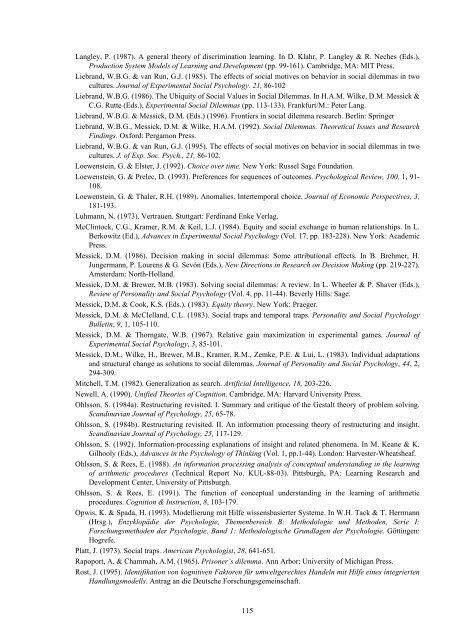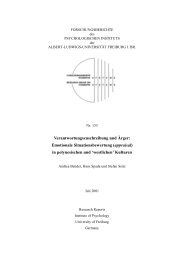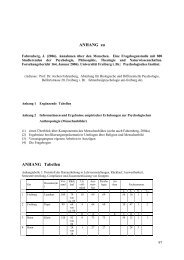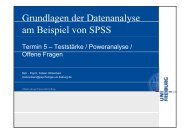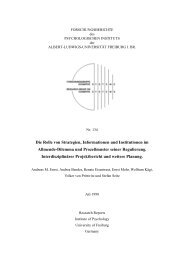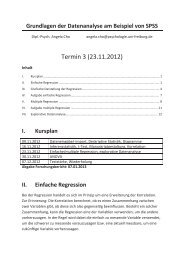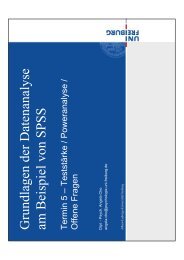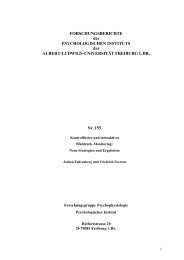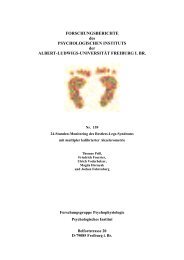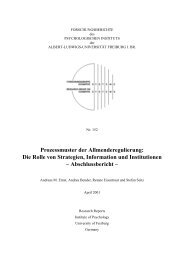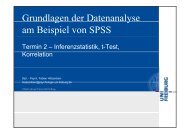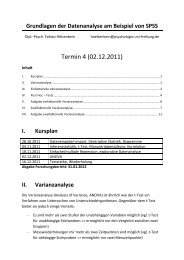Eine computersimulierte Theorie des Handelns und der Interaktion ...
Eine computersimulierte Theorie des Handelns und der Interaktion ...
Eine computersimulierte Theorie des Handelns und der Interaktion ...
Sie wollen auch ein ePaper? Erhöhen Sie die Reichweite Ihrer Titel.
YUMPU macht aus Druck-PDFs automatisch weboptimierte ePaper, die Google liebt.
Langley, P. (1987). A general theory of discrimination learning. In D. Klahr, P. Langley & R. Neches (Eds.),<br />
Production System Models of Learning and Development (pp. 99-161). Cambridge, MA: MIT Press.<br />
Liebrand, W.B.G. & van Run, G.J. (1985). The effects of social motives on behavior in social dilemmas in two<br />
cultures. Journal of Experimental Social Psychology. 21, 86-102<br />
Liebrand, W.B.G. (1986). The Ubiquity of Social Values in Social Dilemmas. In H.A.M. Wilke, D.M. Messick &<br />
C.G. Rutte (Eds.), Experimental Social Dilemmas (pp. 113-133). Frankfurt/M.: Peter Lang.<br />
Liebrand, W.B.G. & Messick, D.M. (Eds.) (1996). Frontiers in social dilemma research. Berlin: Springer<br />
Liebrand, W.B.G., Messick, D.M. & Wilke, H.A.M. (1992). Social Dilemmas. Theoretical Issues and Research<br />
Findings. Oxford: Pergamon Press.<br />
Liebrand, W.B.G. & van Run, G.J. (1995). The effects of social motives on behavior in social dilemmas in two<br />
cultures. J. of Exp. Soc. Psych., 21, 86-102.<br />
Loewenstein, G. & Elster, J. (1992). Choice over time. New York: Russel Sage Fo<strong>und</strong>ation.<br />
Loewenstein, G. & Prelec, D. (1993). Preferences for sequences of outcomes. Psychological Review, 100, 1, 91-<br />
108.<br />
Loewenstein, G. & Thaler, R.H. (1989). Anomalies. Intertemporal choice. Journal of Economic Perspectives, 3,<br />
181-193.<br />
Luhmann, N. (1973). Vertrauen. Stuttgart: Ferdinand Enke Verlag.<br />
McClintock, C.G., Kramer, R.M. & Keil, L.J. (1984). Equity and social exchange in human relationships. In L.<br />
Berkowitz (Ed.), Advances in Experimental Social Psychology (Vol. 17, pp. 183-228). New York: Academic<br />
Press.<br />
Messick, D.M. (1986). Decision making in social dilemmas: Some attributional effects. In B. Brehmer, H.<br />
Jungermann, P. Lourens & G. Sevón (Eds.), New Directions in Research on Decision Making (pp. 219-227).<br />
Amsterdam: North-Holland.<br />
Messick, D.M. & Brewer, M.B. (1983). Solving social dilemmas: A review. In L. Wheeler & P. Shaver (Eds.),<br />
Review of Personality and Social Psychology (Vol. 4, pp. 11-44). Beverly Hills: Sage.<br />
Messick, D.M. & Cook, K.S. (Eds.). (1983). Equity theory. New York: Praeger.<br />
Messick, D.M. & McClelland, C.L. (1983). Social traps and temporal traps. Personality and Social Psychology<br />
Bulletin, 9, 1, 105-110.<br />
Messick, D.M. & Thorngate, W.B. (1967). Relative gain maximization in experimental games. Journal of<br />
Experimental Social Psychology, 3, 85-101.<br />
Messick, D.M., Wilke, H., Brewer, M.B., Kramer, R.M., Zemke, P.E. & Lui, L. (1983). Individual adaptations<br />
and structural change as solutions to social dilemmas. Journal of Personality and Social Psychology, 44, 2,<br />
294-309.<br />
Mitchell, T.M. (1982). Generalization as search. Artificial Intelligence, 18, 203-226.<br />
Newell, A. (1990). Unified <strong>Theorie</strong>s of Cognition. Cambridge, MA: Harvard University Press.<br />
Ohlsson, S. (1984a). Restructuring revisited. I. Summary and critique of the Gestalt theory of problem solving.<br />
Scandinavian Journal of Psychology, 25, 65-78.<br />
Ohlsson, S. (1984b). Restructuring revisited. II. An information processing theory of restructuring and insight.<br />
Scandinavian Journal of Psychology, 25, 117-129.<br />
Ohlsson, S. (1992). Information-processing explanations of insight and related phenomena. In M. Keane & K.<br />
Gilhooly (Eds.), Advances in the Psychology of Thinking (Vol. 1, pp.1-44). London: Harvester-Wheatsheaf.<br />
Ohlsson, S. & Rees, E. (1988). An information processing analysis of conceptual <strong>und</strong>erstanding in the learning<br />
of arithmetic procedures (Technical Report No. KUL-88-03). Pittsburgh, PA: Learning Research and<br />
Development Center, University of Pittsburgh.<br />
Ohlsson, S. & Rees, E. (1991). The function of conceptual <strong>und</strong>erstanding in the learning of arithmetic<br />
procedures. Cognition & Instruction, 8, 103-179.<br />
Opwis, K. & Spada, H. (1993). Modellierung mit Hilfe wissensbasierter Systeme. In W.H. Tack & T. Herrmann<br />
(Hrsg.), Enzyklopädie <strong>der</strong> Psychologie, Themenbereich B: Methodologie <strong>und</strong> Methoden, Serie I:<br />
Forschungsmethoden <strong>der</strong> Psychologie, Band 1: Methodologische Gr<strong>und</strong>lagen <strong>der</strong> Psychologie. Göttingen:<br />
Hogrefe.<br />
Platt, J. (1973). Social traps. American Psychologist, 28, 641-651.<br />
Rapoport, A. & Chammah, A.M. (1965). Prisoner’s dilemma. Ann Arbor: University of Michigan Press.<br />
Rost, J. (1995). Identifikation von kognitiven Faktoren für umweltgerechtes Handeln mit Hilfe eines integrierten<br />
Handlungsmodells. Antrag an die Deutsche Forschungsgemeinschaft.<br />
115


